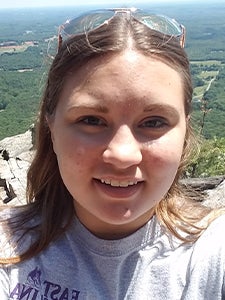Student Profile: Kristin Tyson

Undergraduate researcher Kristin Tyson is studying how amino acids interact with proteins, potentially leading to new medical treatments.
Majors: Chemistry and Biochemistry
Mentor: Dr. Adam Offenbacher
Department: Chemistry
Project Title: “Development of novel tryptophan analogues to study and expand protein function”
My research involves working with amino acids – the building blocks of proteins – to further study the mechanism of electron transfer. I mutate the amino acid tryptophan to further probe its interactions within the protein azurin.
How did you get involved in undergraduate research?
I first heard about undergraduate research through some friends and then I decided to talk to some of the professors myself. From there, I was welcomed with open arms. I always enjoyed the lab courses and undergraduate research was a great way to get more experience in a lab setting.
Why did you choose your research topic?
Working with proteins and amino acids are more on the biological side of chemistry, a field I enjoy dabbling in. I chose my research topic because it encompassed proteins which offer a wide variety of avenues to explore. My topic also involves researching something that has never really been talked about before in academic literature, which is super exciting. Discovering new things are fun.
What’s been your favorite part of conducting undergraduate research?
My favorite part is when the results from an experiment tell a story. I enjoy seeing the outcome from an experiment that sometimes takes days to prep. It is incredibly rewarding to know that your idea has merit to it and can benefit the scientific community.
What challenges have you faced while conducting undergraduate research?
Science is finicky. What you do one day may not work out, but doing the same exact thing the next day can yield great results. It proves to be a challenge when you’re on a deadline. There are also complications that arise when instrumentation decides to act up.
Why is your research important for the average, everyday person?
My research may possibly provide information on creating targeted anti-inflammatory drugs in the future.
What’s your ultimate goal or accomplishment that you hope your research will help you achieve?
I hope my research will help prepare me for a career in industry. I hope to further learn how to use various instruments as well as techniques that can be used universally. Being the first author on a published research article would also be nice.
How do you feel that participating in undergraduate research has helped prepare you for life after college?
I think it has not only prepared me for a career in the field of chemistry, but it has taught me how to work in a group. I feel better prepared to work as a team and communicate with my teammates.
Do you have any advice for other students interested in conducting undergraduate research?
My advice would be to try everything once. The more things you try, the more likely you are to find something you are truly interested and passionate about. Working on something that you enjoy makes the research experience so much better.
